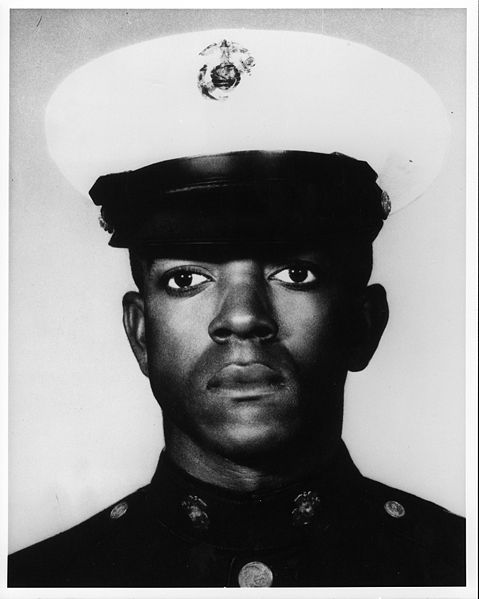
This month, in recognition of National Medal of Honor Day, we’re highlighting many stories filled with acts of heroism and bravery. Today’s will be no different, with this article being focused on the first African-American Marine to receive the Medal of Honor, Pfc. James Anderson Jr.
Early Life
Anderson was born on January 22, 1947, in Los Angeles, California. A kid from Compton, he graduated from Centennial High School and then attended Los Angeles Harbor Junior College. He left to join the Marine Corps in February of 1966 after a year and a half of junior college. By the end of the year, he would go from early training in San Diego, to Camp Pendleton, to Vietnam where he was assigned to the 3rd Marine Division.
Vietnam
On February 1, 1967, the United States launched Operation Prairie II. Its mission was to take care of the enemy forces that were south of the DMZ (Demilitarized Zone). On the 27th of that month, a reconnaissance force attempted to dispatch two enemy soldiers, however, were shocked when they encountered not two soldiers, but a whole company made up of at least 100 men.
The next day, Pfc. Anderson’s platoon was sent to assist in the extraction of the reconnaissance team, where they were almost immediately ambushed. At 3:10 pm, they were ordered to withdraw back to Company L’s position. At this time, Anderson was with a group of men from his platoon about 20 meters from the enemy line. His fellow men were being gunned down, and the situation looked dire.
However, Anderson kept fighting. Soon, an enemy grenade landed beside him. Without an ounce of hesitation, the Private grabbed the grenade and brought it to his chest. He was only 20 years old.
This sacrifice, while not totally shielding the shrapnel, did allow his fellow soldiers to escape with only minor injuries. A moment that could’ve caused multiple fatalities only resulted in one.
Legacy
Pfc. James Anderson Jr. was buried in Carson, California at Lincoln Memorial Park. A year and a half after his death, his parents were presented the Congressional Medal of Honor for his “…personal heroism, extraordinary valor, and inspirational supreme self-sacrifice.” This sacrifice also resulted in the United States Navy naming a Danish merchant vessel after him.
As I write about the actions of Pfc. Anderson, I look across to see my girlfriend cooking in the kitchen. Her dog is currently tearing up an old box of cardboard. I sit in a beautiful apartment building, working a job I love. I am living the dream.
But roughly 55 years ago, a young man, 8 years younger than I am now, decided to forgo the opportunity for such a life to save his fellow man. His story of bravery is one shared by thousands. His sacrifice, a reminder, that one’s character can be defined in a span of seconds.
As we approach the National Medal of Honor Day this year, I implore you to make every second count and to never forget the sacrifice that is made every day by young men and women.
Be sure to share this article with anyone you think would benefit from hearing about Private Anderson’s heroism.


